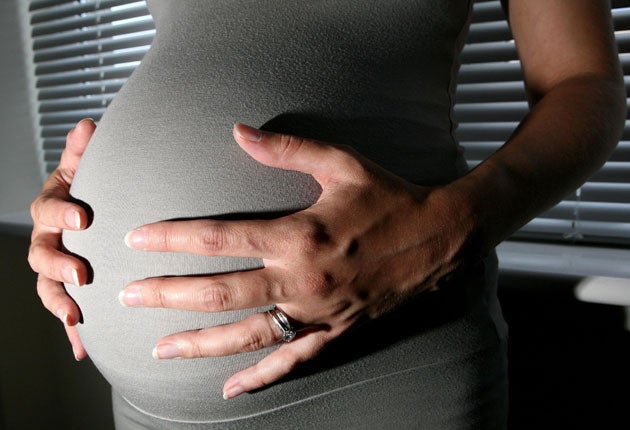Blunder at top clinic sparks fresh IVF fears
Donor sperm with chromosomal abnormalities went unscreened, raising the risk of miscarriage and birth defects

Your support helps us to tell the story
From reproductive rights to climate change to Big Tech, The Independent is on the ground when the story is developing. Whether it's investigating the financials of Elon Musk's pro-Trump PAC or producing our latest documentary, 'The A Word', which shines a light on the American women fighting for reproductive rights, we know how important it is to parse out the facts from the messaging.
At such a critical moment in US history, we need reporters on the ground. Your donation allows us to keep sending journalists to speak to both sides of the story.
The Independent is trusted by Americans across the entire political spectrum. And unlike many other quality news outlets, we choose not to lock Americans out of our reporting and analysis with paywalls. We believe quality journalism should be available to everyone, paid for by those who can afford it.
Your support makes all the difference.A serious blunder at one of Britain's top fertility clinics dramatically increased the risk its patients would suffer a miscarriage or give birth to a child with serious health problems, sparking fresh fears about how IVF centres are run in the wake of a series of scandals.
Unscreened sperm used by staff at the London Women's Clinic (LWC) to create dozens of embryos was later found to have a chromosome abnormality that could have been passed on to any unborn child, The Independent on Sunday has learnt. The British Fertility Society's screening guidelines make it clear that the clinic should never have accepted the donor. At least one couple suffered a miscarriage as a direct result.
The blunder constituted the most severe mistake that a clinic can make, according to the Human Fertilisation and Embryology Authority, which regulates the multimillion-pound IVF sector. In future, the watchdog will name and shame clinics for similar incidents under new rules to expose mistakes and near misses.
Fertility experts believe the LWC's error could be the "tip of the iceberg", and that it raises serious concerns about how the industry is regulated. It is the latest in a series of high-profile incidents, including a couple's last viable embryo being implanted into another woman, and eggs fertilised with the wrong sperm, forcing three couples' embryos to be destroyed.
Guy Forster, a solicitor at the law firm Irwin Mitchell who has represented several couples who have suffered mix-ups, said: "It's fair to say the problem is widespread. The HFEA must do more to ensure clinics meet their responsibilities, and clinics must pay more attention to systems they have in place and not just to success rates."
Dr Sammy Lee, a London-based fertility expert, said the HFEA was failing to ensure clinics followed guidelines. "It's a problem of compliance. The HFEA must make clinics adopt pharmaceutical-style quality audits."
The most recent HFEA figures show there were 182 "incidents" at clinics last year, eight of them serious. But lawyers believe the actual figures could be far higher. Several couples are pursuing legal proceedings.
The London Women's Clinic, one of the UK's top three fertility centres, was warned in the HFEA's latest inspection report last January, after inspectors found its staff failed to carry out "a number of witnessing stages", vital to ensure processes such as sperm screening are done correctly.
Yet as recently as June, the clinic was still using embryos created with unscreened sperm, according to one couple who spoke to the IoS about their ordeal. At least 11 other women are thought to have had treatment using the sperm, including three couples who had frozen embryos in storage. The clinic, in Harley Street, does 1,300 treatment cycles annually and recently recruited more staff to cope with demand.
The prospective mother, who spoke on condition of anonymity, said she suffered a miscarriage as a result of the blunder. The couple paid £15,000 and wasted more than a year trying to become pregnant. "It's left a very bitter taste. We felt that the clinic failed at a very basic level to provide a service we had paid for," she said.
Allan Pacey, secretary of the British Fertility Society, which draws up sperm- screening guidelines, said spotting the abnormality should have been "pretty standard". The couple had to destroy all 22 frozen embryos created with the unscreened sperm. They then faced a bitter compensation battle with the clinic. "It made us so aware that IVF is a business and it all comes down to money," they said. In the end, the clinic paid for them to undergo a further cycle of treatment abroad, and they are now expecting a baby.
Dr Kamal Ahuja, head of the LWC, insisted "all necessary screening" was done on donor sperm. He added that two affected couples had later had healthy babies.
An HFEA spokeswoman said it had audited all the stored samples at the LWC after it was notified about the incident.
Demand for IVF is soaring. Recent figures show the number of treatments rose by 6 per cent in 2007 to nearly 47,000.
Join our commenting forum
Join thought-provoking conversations, follow other Independent readers and see their replies
Comments